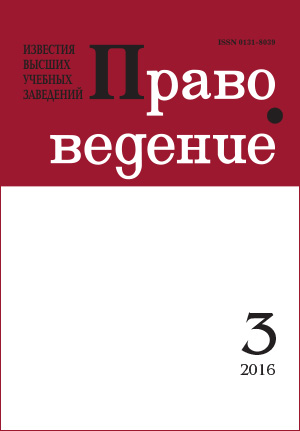The afterlife of parliamentary sovereignty
Abstract
The paper discusses the nature of Parliamentary sovereignty. Firstly, the author reflects on the approaches to understanding the sovereignty before 1991 and then argues that the relevant rule was repealed by the pivotal case of Factortame. Nevertheless, Parliamentary sovereignty enjoyed an afterlife. Though it is no longer a part of the UK Constitution, it still continues to attract the attentions of scholars who, knowingly or unconsciously, apply this label to new constitutional phenomena. The author concludes by reflecting on the problems caused by this situation. When British constitutional lawyers meet, talks often turn to the question of the Parliamentary sovereignty; indeed, it would be hard to avoid this topic. debates about the implications of the Parliamentary sovereignty for the Human Rights Act, for submission of issues to be considered by the bodies designated by the Parliament and accountable before it; and the supposed constraints of its powers during the constitutional reform — all these issues inspire lively debates. The aim of this paper is not to engage into these disputes, but to argue that their participants have wrong perceptions of the subject. Whatever the precise content of the Parliamentary sovereignty is, it ceased to be a distinctive feature of the UK Constitution in 1991. The fact that the Parliamentary sovereignty still generates interest is hazardous; there is a risk of distorting the answers regarding the constitutional reform and of distracting our attention from important features of our modern Constitution. The paper consists of four parts. The first part of the paper outlines the nature of the Parliamentary sovereignty. The second part describes its “death” in the pivotal case of Factortame. The third part recounts the “afterlife” of the Parliamentary sovereignty. The problems arose as a result of it are described in the fourth part of this article.
Keywords:
sovereignty, Parliament, Constitution, rule, court, interpretation, constraints, human rights
Downloads
References
Downloads
Published
How to Cite
Issue
Section
License
Articles of "Pravovedenie" are open access distributed under the terms of the License Agreement with Saint Petersburg State University, which permits to the authors unrestricted distribution and self-archiving free of charge.




